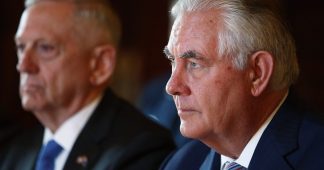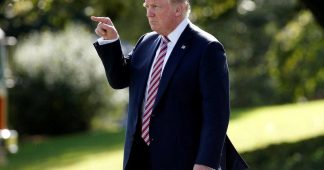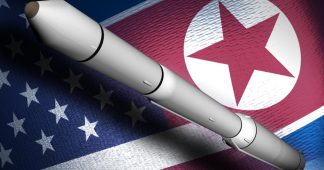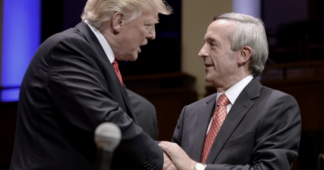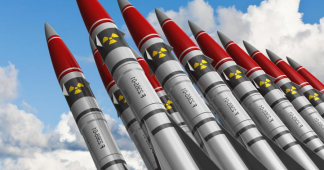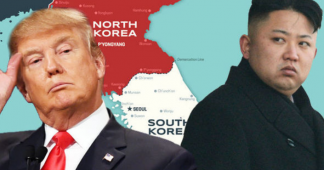By Jim Galloway
Ask Sam Nunn what has kept him awake since Inauguration Day, and he will point you to Florida.
No, not shuffleboard.
Reports of the former Georgia senator’s retirement have been greatly exaggerated. Nunn has indeed given up his post as CEO of the D.C.-based Nuclear Threat Initiative, but in his head, the NTI co-founder is simply ceding the paperwork. At only 78, he doesn’t intend to curb his globe-trotting ways.
What gives Nunn insomnia can be found today within the confines of Mar-a-Lago, Donald Trump’s private club in Palm Beach. That’s where the president will receive Chinese President Xi Jinping for their first summit. Topics will include trade and North Korea.
So what worries Nunn? There is Trump himself, of course, and his itchy Twitter fingers.
Nunn has witnessed how an American president’s options can shrink when he divorces himself from the facts. He first arrived in Washington in 1973, as Richard Nixon was imploding. “I saw what happens when the credibility of a president goes downhill. It’s against everybody’s interests for Trump to lose credibility. He’s lost some, but he hasn’t gotten to the dangerous stage,” Nunn said. “But I worry about that.”
The loss of credibility can be contagious.
Last January, Nunn was in a Senate hearing room to introduce and endorse Rex Tillerson, the former CEO of ExxonMobil, as Trump’s nominee for secretary of state.
Three months later, Tillerson still hasn’t been allowed to assemble his own staff. This week, Jared Kushner, Trump’s son-in-law, made the Trump administration’s first foray into Iraq. Not Tillerson. Kushner has also been placed in charge of restarting negotiations between Israelis and Palestinians.
“If it’s not coordinated, it certainly undermines [Tillerson] around the world. There’s no doubt about that,” the former senator said.
We were sitting at a table in the office that Georgia Tech reserves for him on the edge of Atlanta’s industrial district, which allowed Nunn to nibble on a late lunch of chicken nuggets. He had ordered four nuggets, was given eight, and wanted to share. Clearly, a nuclear-capable North Korea had dampened his appetite.
I asked Nunn about President Trump’s stated willingness to go it alone when it comes to North Korea and its nuclear ambitions. “We win any military conflict. But what does winning mean when your ally’s capital city has a huge amount of destruction?” Nunn asked.
North Korea’s ability to put a small nuclear weapon atop an ICBM that’s capable of hitting the American mainland is still one to three years away. That’s a concern, but not an immediate worry.
What keeps Nunn awake at night is his knowledge that North Koreans dig tunnels. And they’re really, really good at it. This means Supreme Leader Kim Jong-un may have some sense of surviving a nuclear attack. But it also means that North Korea is fully capable of tunneling under the 38th parallel and setting off nuclear fireworks in the vicinity of Seoul.
They’ve dug such tunnels “over and over,” Nunn said. “To me, it’s not all about missile development.”
But negotiations between the U.S. and China over the North Korean situation can’t be tied to trade, a linkage that Nunn termed “bizarre.” Nor to sovereignty for Taiwan – though Trump appears to have backed off that.
China fears a South Korean invasion of North Korea, and the possibility of U.S. troops on its borders. Or a collapse of the North Korean regime, or a coup that topples Kim and sends hundreds of thousands of refugees into northern China.
“You’ve got to talk about those things. There will be no solution to the North Korea problem, in my view, without the U.S. and China working together,” Nunn said – and then added. “No peaceful solution.”
“I hope we’re better prepared than I fear, to have that discussion,” Nunn said. “Because I really do believe the Chinese want to solve the North Korean nuclear problem.”
Still sleepy? Let Nunn tell you a bedtime story about intermediate-range nuclear missiles, from which the U.S. and Soviet Union agreed to abstain – ‘way back in ’87, when Nunn was a senator. In February, it was reported that Russia has deployed cruise missiles with a range well-suited for western Europe.
“I think it’s a very serious breakdown. It’s no secret that Russia thinks – why should the United States and Russia be the only two countries in the world that don’t have intermediate missiles,” Nunn said. “They’re on the verge of wanting to break out of that treaty. I think it will be a real setback.”
And that makes another summit necessary for Trump. This time, with his friend Vladimir Putin. No deal is necessary – just a simple statement.
“If they start off by saying a nuclear war cannot be won and must not be fought – it sounds simple, but that message needs to go out to all the troops that are out there on the bombers and in the silos, in both countries,” Nunn said.
We finally got around to Russia’s efforts in the 2016 presidential contest. Nunn was happy that his old chamber, the U.S. Senate, was pursuing the matter in bipartisan fashion.
Russian involvement and possible collusion by Trump campaigners all argue for a thorough probe, Nunn said. But that wasn’t his largest worry.
People forget the many rules between the U.S. and Russia that rose out of the Cold War. That hasn’t happened with this new field of cyberwarfare.
“What bothers me is that there are no rules of the road at all on cyber,” Nunn said. And aggression is not going to stop with presidential elections.
“If there are no red lines, then what do you do about command-and-control? What do you do about interfering with each other’s missiles? What do you do about false warnings?” Nunn asked. “It’s not that we’re the only two players. This is a huge security lapse on the part of both nations.”
And that has what kept Sam Nunn up since Jan. 20. The world has become a far more risky place. Now go get some coffee
